Picture
Your Present Location: HOME> PictureResearch Report on The Development of China’s Green Finance 2018 released in RDCY
On October 13, a conference and seminar on launching the new book Research Report on The Development of China’s Green Finance 2018, co-sponsored by Chongyang Institute for Financial Studies of Renmin University of China (RDCY) and Center for Eco-financial Studies of Renmin University of China, were held in Beijing.
Wu Xiaoqiu, vice-president and professor of Renmin University of China, academic consultant of Research Report on The Development of China’s Green Finance 2018, attended the meeting and delivered a keynote speech. Wang Wen, executive dean of the RDCY, secretary of the Green Finance Committee of Financial Association of China, chief editor of the book Research Report on The Development of China’s Green Finance 2018, made an introductory speech.
Lan Hong, deputy director of Center for Eco-financial Studies of Renmin University of China, professor of the Environmental College of Renmin University of China, executive editor-in-chief of the Research Report, elaborated on the book. Yin Hong, the deputy director of the Institute of Urban Finance of Industrial and Commercial Bank of China and Deputy Secretary of the Green Finance Professional Committee of Financial association of China, chief executive editor of the Research Report, spoke on behalf of the partners.
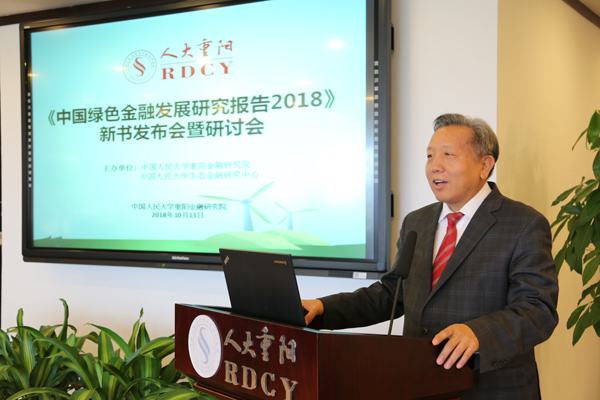
In Wu Xiaoqiu’s keynote speech, he pointed out that one of the three major challenges China faces is pollution prevention and control, which will be an important task to our country for quite a long time. Finance cannot excessively pursue profits. Protecting the ecological environment is a basic duty for finance.
He put forward three viewpoints with the current reform in China's finance and the changes in internationalization.
Firstly, China has encountered the most complicated external situation since the reform and opening up, the core of which is the arrival of a brand new globalization. It’s very important that the new globalization is without barrier, nations almost pursue full liberalization. China is not afraid of competition and can remove many obstacles, including tariffs. The new era emphasizes fairness and equality and is slowly weakening national differences. Some developed countries may have advantages in the short period, but they have no long-term advantages.
Secondly, financial issues should be thought rationally. We need to see the future tendency and not watch back. To promote the development of China’s finance and enhance China’s competitiveness, it’s not enough to turn to a simple pattern and be able to control crisis. Diversity is a basic feature in modern finance. We should create a large number of financing instruments that match risks and benefits at different levels for financiers to choose and provide the society with good liquidity, high transparency, matching, and combining assets. Financial industry needs to be diverse, because it must satisfy the financial needs of different groups of people and meet different financial risks, so as to satisfy enterprises that traditional finance cannot cover. This can only be achieved through reform, innovation and marketization.
Thirdly, reform and opening up is becoming extremely important. Chinese stock market, currency market and bond market have certain risks in different degrees. It’s very important to consider the basic direction of financial reform and market. If the direction is not clear, short-term measures will be useless. It will only make the country bear more and more burdens. The foreign exchange market is facing a test, but it is not a big problem. Professor Wu mentioned that he don’t think the RMB has a crisis. A balance should be found between the long-term credit of the RMB and the economic growth target, and the foundation for long-term confidence in the RMB should be built first.
In general, Professor Wu emphasized that China's finance has a good future, and all problems can be solved through reform and opening up.
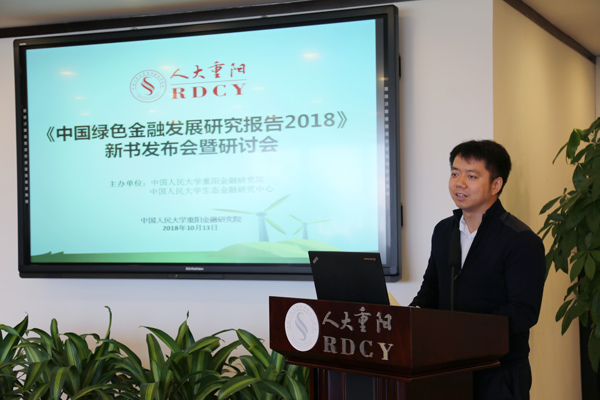
Wang Wen mentioned in his speech that he, from a onlooker and a participant to a promoter, experiences the progress of formulation and implementation of green financial policies. And in four years, China's green finance has grown from zero to the world's largest and most robust system. He said that starting from 2017, for two consecutive years, Renmin University of China and Industrial and Commercial Bank jointly wrote the Research Report on The Development of China’s Green Finance. With the guidance of President of Renmin University of China Liu Wei, President of the Industrial and Commercial Bank of China and Vice President Wu Xiaoqiu, the “Research Report on The Development of China’s Green Finance” series has become the most authoritative, the most comprehensive interdisciplinary report. Gratitude should be expressed to the dozens of teachers and experts who participated in the writing and integration of the report. It’s their efforts that our green finance business move forward steadily. And it’s the steady progress of research that we are able to develop the overall market and policies.
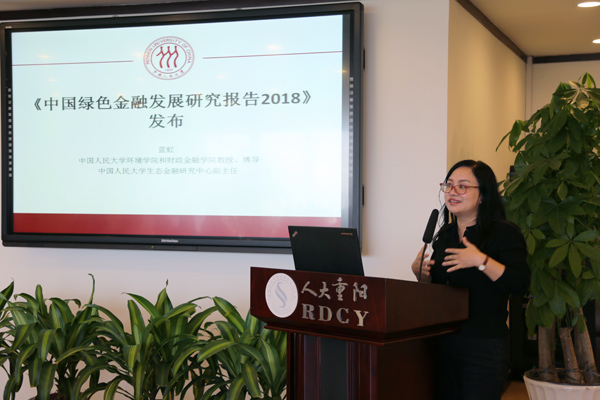
Lan Hong mentioned that green finance is a branch of finance and its ultimate goal is our ecological civilization construction. In this case, green finance promises to be the mainstream of future finance. The biggest highlight of China's green finance in 2017 is the pilot of green finance in five provinces. Green finance is pushed from the demand side to the supply side, enhancing the demand side to realize the connection between the demand side and the supply side. Several pilot areas strive to provide more funds to support the development of green industries by using various financial instruments and reducing the financing cost, she added.
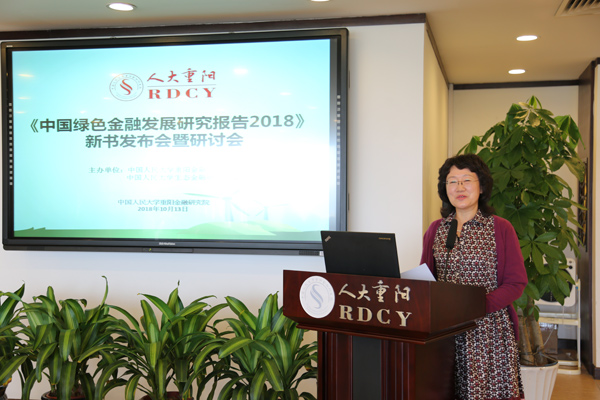
Yin Hong, representative of the partner, mentioned that there is an internal force to drive commercial banks to develop green finance and be transformed into green development. First, this may be a new market. Second, high-pollution projects may be a risk. Third, government’s policy has influence. Commercial banks should play a good role as an intermediary to support the development of green finance.
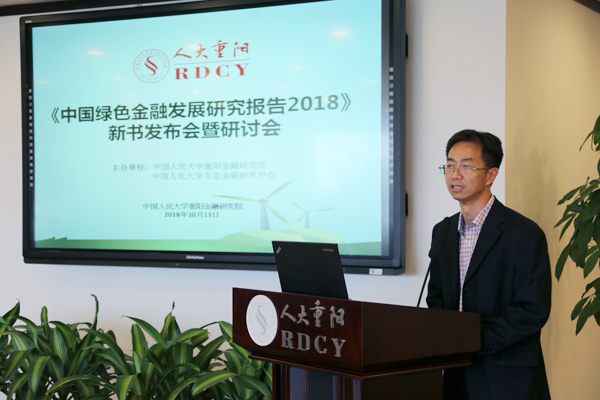
The section of releasing the new book Research Report on The Development of China’s Green Finance 2018 was hosted by Cao Mingdi, deputy director of the Green Finance Department of RDCY and researcher of the Center for Eco-Financial Studies of Renmin University of China.
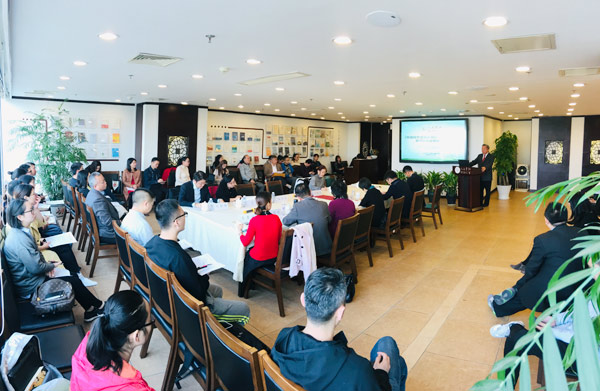
Later, the conference entered the discussion section of “China's Green Finance Reform and Future Trends”, hosted by Lan Hong. The participants included Cai Yu, deputy secretary-general of China Insurance Association and deputy director of China Finance Association Green Finance Committee, Ge Chazhong, Director of the Environmental Policy Department at Environmental Planning Institute of the Ministry of Ecology and Environment, Liu Yuan, deputy director of the Environmental Consultation Center of the Environmental Protection Foreign Cooperation Center of the Ministry of Ecology and Environment, Mei Dewen, President of the Beijing Environment Exchange, Liu Zhonghui, General Manager of Zhongke Ruimei (Tianjin) Environmental Technology Co., Ltd., and Wang Sujuan, chief editor of China Financial Publishing House and responsible editor of Research Report on The Development of China’s Green Finance 2018.























































































 京公网安备 11010802037854号
京公网安备 11010802037854号





